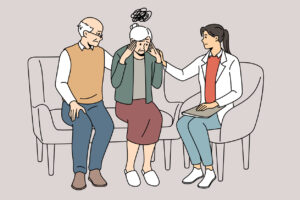Dementia
 Dementia is not a single disease, but rather a general term for a decline in mental ability severe enough to interfere with daily life. It’s characterized by a group of symptoms affecting memory, thinking, and social abilities. Understanding the complexities of dementia is crucial for providing appropriate care and support to those affected.
Dementia is not a single disease, but rather a general term for a decline in mental ability severe enough to interfere with daily life. It’s characterized by a group of symptoms affecting memory, thinking, and social abilities. Understanding the complexities of dementia is crucial for providing appropriate care and support to those affected.
Understanding Dementia:
- Definition:
- Dementia is a syndrome, meaning it’s a collection of symptoms, rather than a specific disease.
- It involves a progressive decline in cognitive function, beyond what is considered normal aging.
- Dementia is a syndrome, meaning it’s a collection of symptoms, rather than a specific disease.
- Key Affected Areas:
- Memory: Difficulty remembering recent events, names, and familiar places.
- Communication and language: Trouble finding words, following conversations, and expressing thoughts.
- Attention and focus: Difficulty concentrating and staying organized.
- Reasoning and judgment: Problems with decision-making, problem-solving, and understanding consequences.
- Visual perception: Difficulty with spatial awareness and recognizing objects.
- Memory: Difficulty remembering recent events, names, and familiar places.
Common Types of Dementia:
- Alzheimer’s Disease:
- The most common form of dementia.
- Characterized by the buildup of plaques and tangles in the brain, damaging nerve cells.
- Primarily affects memory and cognitive function.
- The most common form of dementia.
- Vascular Dementia:
- Caused by damage to blood vessels in the brain, often due to strokes or other vascular problems.
- Symptoms can vary depending on the area of the brain affected.
- Caused by damage to blood vessels in the brain, often due to strokes or other vascular problems.
- Lewy Body Dementia:
- Involves the buildup of Lewy bodies (protein deposits) in the brain.
- Characterized by fluctuating cognitive function, visual hallucinations, and movement problems.
- Involves the buildup of Lewy bodies (protein deposits) in the brain.
- Frontotemporal Dementia:
- Affects the frontal and temporal lobes of the brain, leading to changes in personality, behavior, and language.
- Affects the frontal and temporal lobes of the brain, leading to changes in personality, behavior, and language.
Risk Factors:
- Age: The greatest risk factor.
- Family history: Genetic predisposition.
- Cardiovascular disease: Factors that damage blood vessels, such as high blood pressure and high cholesterol.
- Lifestyle factors: Smoking, excessive alcohol consumption, and lack of physical activity.
- Traumatic brain injury: Previous head injuries.
- Certain medical conditions: Such as diabetes.
Symptoms:
- Early Signs:
- Memory loss that disrupts daily life.
- Challenges in planning or problem-solving.
- Difficulty completing familiar tasks.
- Confusion with time or place.
- Trouble understanding visual images and spatial relationships.
- New problems with words in speaking or writing.
- Misplacing things and losing the ability to retrace steps.
- Decreased or poor judgment.
- Withdrawal from work or social activities.
- Changes in mood and personality.
- As dementia progresses, symptoms worsen, and individuals may experience:
- Increased confusion and disorientation.
- Difficulty with communication and swallowing.
- Behavioral changes, such as agitation, aggression, and wandering.
- Loss of mobility and independency
- Increased confusion and disorientation.
- Memory loss that disrupts daily life.
Progression:
- Medical history and physical exam: To rule out other medical conditions.
- Cognitive tests: To assess memory, thinking, and problem-solving skills.
- Brain imaging: Such as MRI or CT scans, to identify brain abnormalities.
- Laboratory tests: To check for underlying medical conditions.
Management and Support:
- Medications: Some medications can temporarily improve cognitive function or manage behavioral symptoms.
- Therapies: Occupational therapy, speech therapy, and cognitive rehabilitation can help individuals maintain independence.
- Lifestyle changes: A healthy diet, regular exercise, and social engagement can support brain health.
- Supportive care: Creating a safe and supportive environment, providing assistance with daily tasks, and offering emotional support.
- Caregiver support: Providing resources and support for family members and caregivers.
Prevention:
- Regular exercise.
- Healthy diet.
- Maintaining a healthy weight.
- Not smoking.
- Managing cardiovascular risk factors.
- Staying socially and mentally active.While there’s no guaranteed way to prevent dementia, adopting a healthy lifestyle can reduce the risk:
Dementia is a challenging condition, but with proper care and support, individuals can maintain a good quality of life.